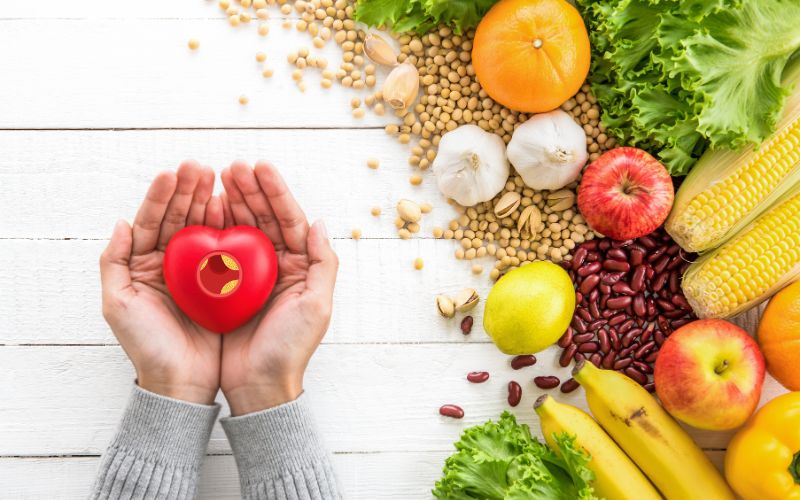Your diet can affect the amount of cholesterol in your blood. By making conscious dietary choices, you can manage your cholesterol levels effectively. Reducing your intake of saturated and trans fats, incorporating more fibre and healthy fats into your diet, and choosing foods with beneficial nutrients like plant sterols can all contribute to better heart health.
This article by a dietician in Delhi at Madhuban Diet Care, Nutrition clinic in Pitampura, will help you understand how to control high cholesterol with a proper diet and the relationship between high cholesterol and kidney disease.
Foods that help in maintaining high cholesterol
Oats
Oats are a good source of fibre, vitamins, minerals, and other nutrients that may help lower cholesterol levels. The cholesterol-lowering effect of oats is thought to be due to beta-glucan, a type of soluble fibre found in oats.
Eating a bowl of oatmeal or cold oat-based cereal for breakfast can provide 1 to 2 grams of soluble fibre. Nutrition guidelines recommend getting 20 to 35 grams of fibre daily, with at least 5 to 10 grams of soluble fibre. Eating oats, oat bran, and other soluble fibres can somewhat reduce total and LDL cholesterol when consumed as part of a diet low in saturated fat.
Beans
Eating beans may help lower cholesterol levels. A 2021 study found that adults with high LDL cholesterol who ate one cup of canned beans per day had significantly lower LDL levels after 29 days. A meta-analysis of 26 studies also found that eating beans, either on their own or as part of pulses, significantly lowered LDL cholesterol.
Green beans are especially good for heart health because they contain soluble fibre, which can help lower LDL cholesterol levels. Beans and legumes can also help reduce blood sugar levels and increase healthy gut bacteria.
Eggplants
Eggplants can help lower cholesterol levels as they contain soluble fibre and chlorogenic acid. Soluble fibre can reduce total cholesterol by 3–7%, and chlorogenic acid can lower LDL cholesterol, or “bad” cholesterol. In one study, researchers found that eating eggplant lowered LDL cholesterol by up to 30%.
Eggplant is also low in calories and carbs and contains antioxidants that may help protect against heart disease. Some animal studies have found that eggplant may also improve heart function and reduce triglyceride levels.
Vegetable oils (avocado, almond, etc)
According to one study, avocado oil can help reduce LDL (bad) cholesterol and triglyceride levels, while increasing HDL (good) cholesterol in people with high cholesterol. Avocado oil is rich in nutrients like oleic acid, polyunsaturated fats, and carotenoids, which are linked to improved heart, skin, and eye health.
Avocado oil is similar to olive oil in terms of nutritional value and utility. Cold-pressed avocado oil is unrefined and retains some of the fruit’s flavour and colour, making it greenish.
Fruits
Some fruits can help you maintain cholesterol levels, like:
- Bananas. They contain fibre and potassium, which can reduce cholesterol and blood pressure.
- Citrus fruits. Oranges, lemons, grapefruits, and jackfruits are high in vitamin C, an antioxidant that can help reduce LDL oxidation.
- Berries. Blackberries, strawberries, blueberries, and raspberries are good sources of soluble fibre and antioxidants, which can help protect heart health.
Soy
Soy protein may help lower low-density lipoprotein (LDL) cholesterol, also known as “bad” cholesterol. However, some studies have shown that soy protein can significantly decrease LDL cholesterol and increase high-density lipoprotein (HDL) cholesterol.
Eating 25 grams of soy protein daily for six weeks lowered LDL levels by about 3% to 4%. Clinical trials have also shown that consuming 25 to 50 grams of soy protein can reduce LDL cholesterol by about 4% to 8%. The beneficial effects of soy are greater in people with hypercholesterolemia.
Nuts
Some nuts, like almonds, pistachios, walnuts, and pecans, may help lower cholesterol levels. Nuts are a natural source of phytosterols, which can reduce cholesterol absorption and increase excretion. Walnuts contain omega-3 fats, which may help protect the heart and lower the risk of heart attack.
You should eat nuts in moderation because they are high in calories and contain fat. Adults should eat about 4 to 6 servings of unsalted nuts a week, which is a small handful of whole nuts.
It is recommended to consult your diet specialist before picking any diet for yourself
Relationship between high cholesterol and kidney disease
High cholesterol can increase the risk of kidney disease and kidney problems. Cholesterol is a fatty substance that can build up in blood vessels, narrowing them and potentially blocking blood flow to certain parts of the body. When this happens in the heart vessels, it’s called coronary heart disease and can lead to a heart attack.
In people with chronic kidney disease (CKD), heart disease is the leading cause of death. Cholesterol plaque can also clog the renal arteries, cutting off blood flow to the kidneys and causing kidney function loss.
It is important to take care of your health and see your nearest doctor in case you incur any symptoms of high cholesterol. You must make significant changes in your diet to maintain a healthy lifestyle. Avoid eating sugar products and add more nuts to your smoothies, fruit platters, milkshakes, etc. Reach out to the best Kidney doctors in Delhi at Madhuban Kidney Care and Diet Clinic to assist you in lowering your high cholesterol levels and other problems.


